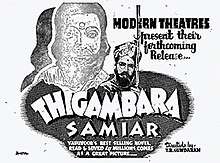Thigambara Samiar
Thigambara Samiar (transl. Skyclad monk) is 1950 Indian Tamil-language thriller film produced and directed by T. R. Sundaram. An adaptation of Vaduvoor K. Duraswamy Iyengar's novel of the same name, the film stars M. N. Nambiar and M. S. Draupadi. It revolves around the efforts of a man to expose the illicit activities of a corrupt lawyer. The film was released on 29 September 1950, and emerged a commercial success.
| Thigambara Samiar | |
|---|---|
 Poster | |
| Directed by | T. R. Sundaram |
| Produced by | T. R. Sundaram |
| Screenplay by | Ko. Tha. Shanmugasundaram |
| Story by | Vaduvoor K. Duraswamy Iyengar |
| Based on | Thigambara Samiar |
| Starring | M. N. Nambiar M. S. Draupadi |
| Music by | G. Ramanathan S. M. Subbaiah Naidu |
| Cinematography | G. R. Nathan D. S. Kotnis |
| Edited by | L. Balu |
Production company | |
Release date |
|
Running time | 173 minutes |
| Country | India |
| Language | Tamil |
Plot
The film revolves around the efforts of Chokkalingam Pillai (Thigambara Samiar) to expose the illicit activities of S. S. Sattanathan Pillai, a corrupt lawyer.
Cast
|
|
Production
Thigambara Samiar, an adaptation of the novel of the same name by Vaduvoor K. Duraswamy Iyengar, was directed by T. R. Sundaram who also produced it under Modern Theatres.[2] It was a rare heroic role for M. N. Nambiar, who was generally known for negative roles.[3] The scenario was written by Ko. Tha. Shanmuga. Cinematography was handled by G. R. Nathan and T. S. Kotnis, and editing by L. Balu. Choreography of the dances was done by Vazhuvoor B. Ramiah Pillai, Madhavan and R. T. Krishnamoorthi[1]
Themes
According to historian Randor Guy, the film re-uses a theory from the novel, "that if a man is made to stay awake without sleep for three or four days, he will be in a mood to confess everything hidden in his mind".[4]
Soundtrack
The music was composed by G. Ramanathan and S. M. Subbaiah Naidu and the lyrics were written by Ka. Mu. Sheriff, A. Maruthakasi, K. B. Kamakshisundaram, Kannadasan and Thanjai N. Ramaiah Dass. Playback singers are K. V. Janaki, U. R. Chandra, K. B. Komalam, Gajalakshmi, P. Leela, Master Subbaiah and V. T. Rajagopalan. "Oosi Pattasey Oosi Pattasey" is based on "O Dilwalo Dil Ka Lagana Acha Hai" from the Hindi film Patanga (1949) and "Paarudappa Paarudappa Paarudapppa" is based on "Lara Lappa Lara Lappa" from Ek Thi Larki, another 1949 Hindi film.[4][5]
| No | Songs | Singer | Lyrics | Length |
|---|---|---|---|---|
| 1 | "Mappillai Paar Asal" | P. Leela and K. V. Janaki | 04:40 | |
| 2 | "Naathar Mudi Meliruukkum" | P. Leela | Pambatti Siddhar | 02:48 |
| 3 | "Vaazhvil Thaane Yaavum" | K. B. Komalam | 03:10 | |
| 4 | "Anna Oru Paithiyamaai" | Gajalakshmi | 02:12 | |
| 5 | "Kaakka Vendum Kadavule" | P. Leela and K. V. Janaki | 07:13 | |
| 6 | "Eppothum Intha Keli Pechu" | U. R. Chandra | 02:00 | |
| 7 | "Sanmarkam Thiyagam" | Master Subbaiah | 03:04 | |
| 8 | "Vaazha Piranthavar Naame" | Master Subbaiah, Chorus | 02:30 | |
| 9 | "Oosi Paattasey" | Gajalakshmi & V. T. Rajagopalan | 02:16 | |
| 10 | "Paarudappa Paarudappa" | Master Subbaiah | 02:59 | |
| 11 | "Podi Poyendi Sikiram Eduthuvaa" | U. R. Chandra | 02:00 | |
| 12 | "Yen Indha Penn Jenmam" | K. B. Komalam | 02:09 | |
| 13 | "Yen Idam Vizhai Thalam" | P. Leela | 03:11 | |
| 13 | "Yen Adase Azhiga Raja" | P. Leela | 02:02 | |
Release and reception
Thigambara Samiar was released on 29 September 1950,[2] and emerged a commercial success.[4]
References
- Thigambara Samiar (motion picture) (in Tamil). Modern Theatres. 1950. Opening credits, from 0:00 to 2:15.
- Film News Anandan (2004). Sadhanaigal Padaitha Thamizh Thiraipada Varalaru [Tamil film history and its achievements] (in Tamil). Sivagami Publishers. Archived from the original on 9 December 2019. Retrieved 20 February 2020.
- Shekar, Anjana (21 November 2019). "The villain with a heart of gold: Remembering MN Nambiar on his birth centenary". The News Minute. Retrieved 20 February 2020.
- Guy, Randor (31 October 2008). "Digambara Saamiyar 1950". The Hindu. Archived from the original on 20 February 2020. Retrieved 20 February 2020.
- Gopalakrishnan, P V (15 May 2017). "FIlmy Ripples- Inspired plagiarism in early music". The Cinema Resource Centre. Archived from the original on 3 October 2017. Retrieved 20 February 2020.